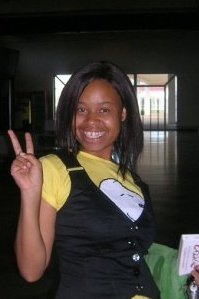The Faffy in Mai Faffy’s: a tribute to Tafadzwa Karase (1985-2010)
Tuesday, April 20th, 2010 by Fungai Machirori If you have spent any amount of time in Harare, you’ll know of a popular spot called Mai Faffy’s. Located in the heart of Avondale – at one of the city’s busiest shopping complexes – Mai Faffy’s serves some of the tastiest sadza and relish to be had in Harare.
If you have spent any amount of time in Harare, you’ll know of a popular spot called Mai Faffy’s. Located in the heart of Avondale – at one of the city’s busiest shopping complexes – Mai Faffy’s serves some of the tastiest sadza and relish to be had in Harare.
And as with any place named in such affectionate terms, there is a story behind Mai Faffy’s – a story I recall Faffy herself telling me.
After a spell of giving birth to only baby boys, Faffy’s mother finally had a baby girl – a girl she named Tafadzwa.
Faffy was the term of endearment that the family used to call Tafadzwa and it stuck so hard that everyone called her Faffy from then onwards.
Even to the day she died.
Faffy died in a car accident last week Monday, on the 12th of April – a needless loss at the young age of 24. She would have turned 25 in October.
I only learnt of her death last Thursday from her best friend who sent me an SMS to tell me the shocking news.
It’s still unbelievable.
You may not have known Faffy, but on behalf of all who did know her – and in particular her friends and family – there is need to remember this remarkable young woman who has left this earth too soon.
What do you say when someone so full of life and promise dies so prematurely? Where do you start?
I remember getting a call from Faffy the day before I left to relocate to South Africa in November last year.
Faffy called me early in the evening wanting to make a plan to go out as her farewell gift to me.
I told her that I had a heap of ironing to do and would have to think about it first. Her response was typical Faffy.
“Stuff the iron in your bag and get all that done when you get to SA!”
In her world, there was too much living to be done without having to worry about mundane chores. I obviously didn’t listen to her, but now I wish I had and had just seized the moment and added yet another memory to the collection of brief moments that I spent with her.
When I asked her best friend, who’s also called Tafadzwa, what she’d like me to share about Faffy, she gave me a long list of things.
But perhaps the most striking thing she shared was the range of people who attended Faffy’s funeral this past Saturday to pay their final respects to her. The lady who sold tomatoes from the corner of the block where Faffy lived came. Her neighbour, who named her child in honour of Faffy for escorting her to hospital in the desperate final stages of labour, also came.
Her kindness and accommodation of all people was well known and celebrated by those who loved and appreciated her most as they bade her a fond farewell.
Tafadzwa and I wanted to let you know about our remarkable friend, about the girl who always made time to brighten someone’s day, about the girl behind Mai Faffy’s.
She will live on in the vibe and atmosphere of Mai Faffy’s, in the laughter and chatter of friends and strangers alike who gather there each and every day.
So long Faffy, and thank you for the memories of a life well lived.









